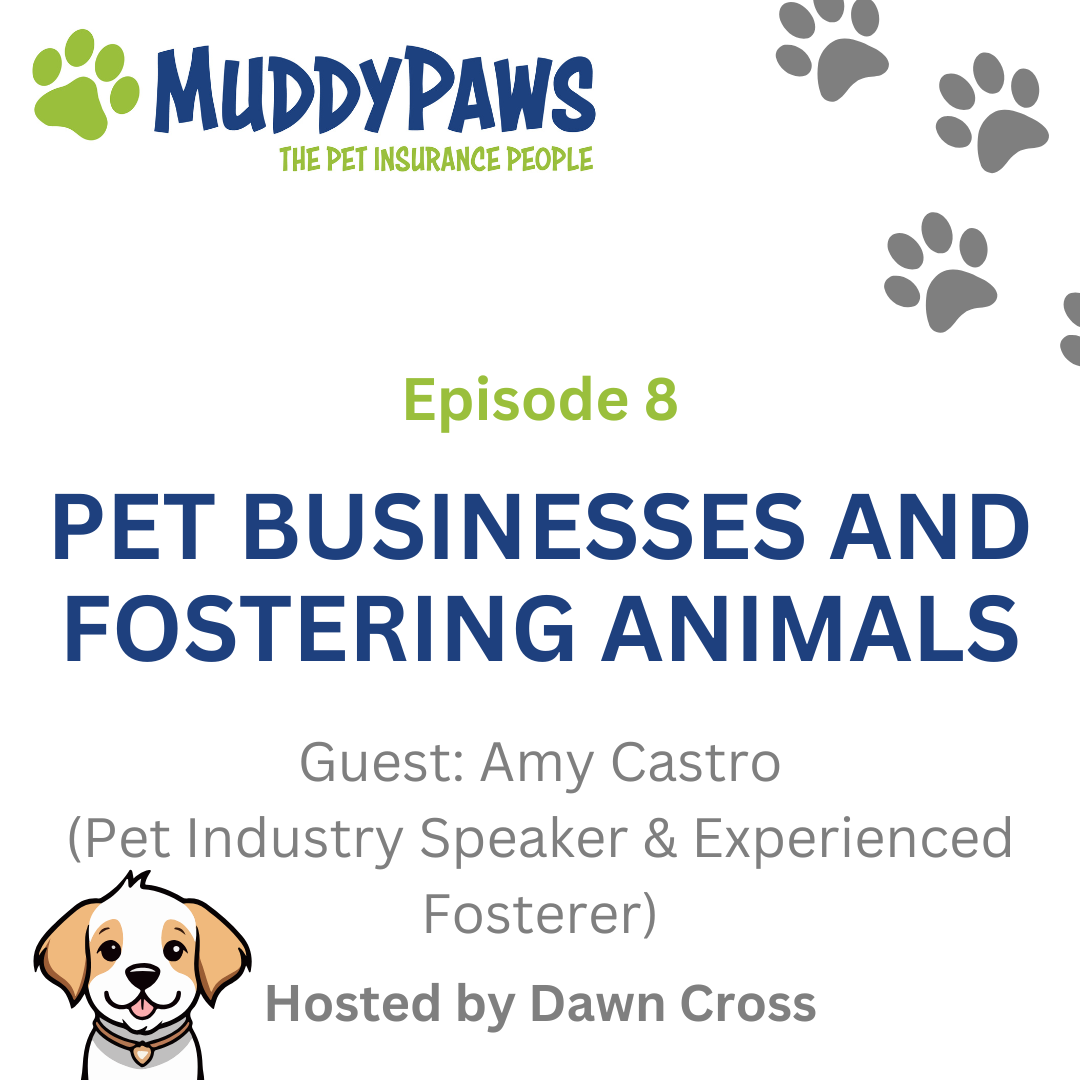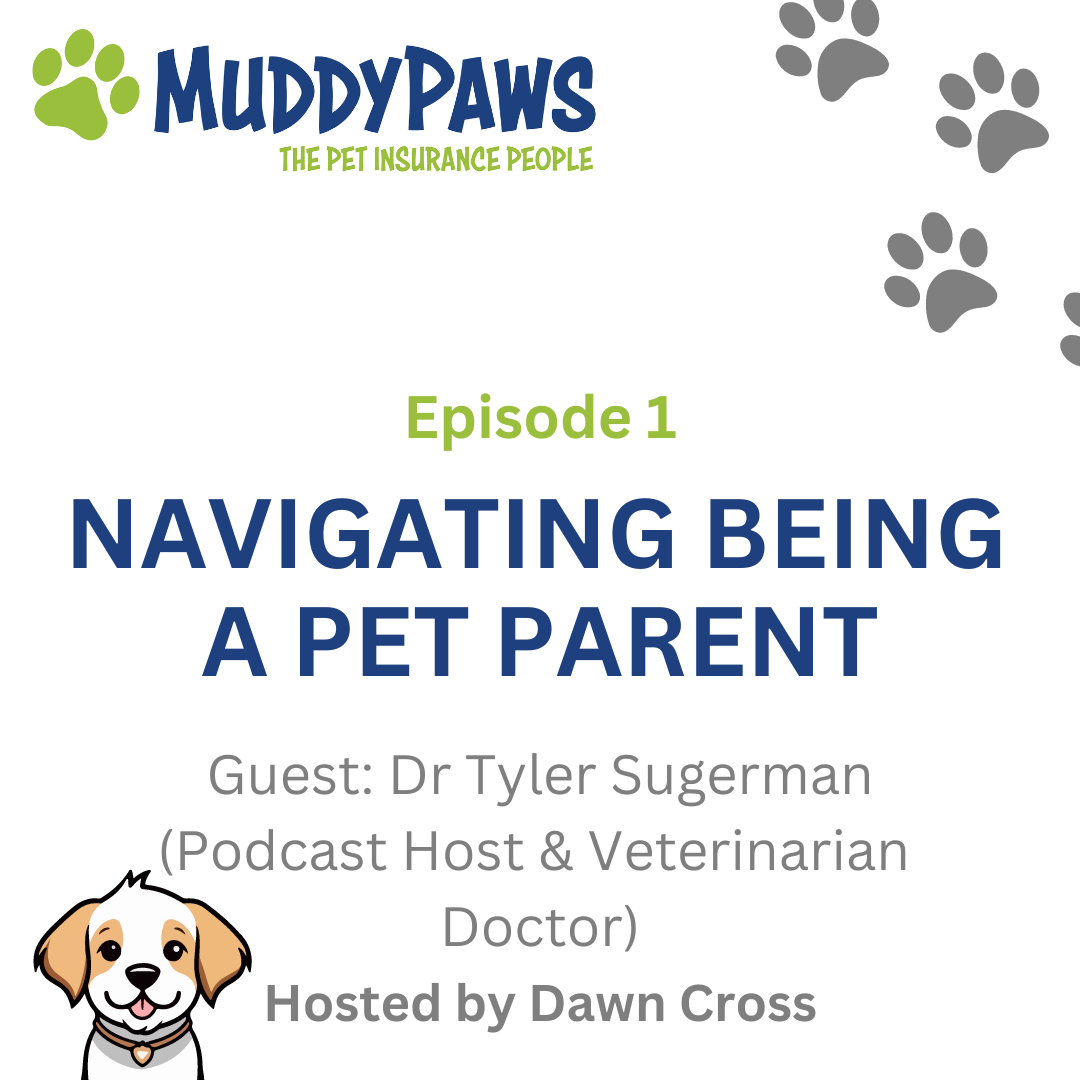Episode Transcript
[00:00:02] Speaker A: Welcome to the Muddy Paws Insurance podcast. I'm your host, Dawn Cross, and today I'll be discussing pet businesses and fostering animals with Amy Castro, pet industry speaker and experienced foster.
If you enjoy our podcast, make sure to leave a weight of your favourite podcast director.
[00:00:20] Speaker B: Thanks so much for coming onto our podcast. If I could get you to introduce yourself and give your business to a life start.
[00:00:27] Speaker C: All right, well, my name is Amy Castro and my business, my company is called Triad Communication Reach out because they would give it my name. So I actually, my web address is actually amycastro.gov, just seemed easier to find. But what I basically do is I work with organizations of multiple types to.
[00:00:47] Speaker D: Help them improve their workplace communication.
[00:00:50] Speaker C: So I help leaders develop communication skills.
I help teams develop their communication skills for acting, interacting with each other and their customers, which is obviously super important. And then I'll come in also and deal with any kind of specific types of situations that they might be facing, like productivity issues or conflict. Conflict is obviously very common in our lives and it happens when humans interact. So I will help them with that. And assertiveness. I work with a lot of veterinary clients and working with them in being more assertive in their communication, they tend to be so compassionate and caring almost to their own detriment sometimes. And a lot of people who work with.
[00:01:38] Speaker B: How did you come to like, how did this all come to be like, how did you come up with the idea?
[00:01:45] Speaker C: Well, it was kind of an interesting thing. So I went to school, my undergraduate degree is in journalism. And then I went into the Air Force and I used that, I used those skills and I got a master's degree while I was there because that was something that was highly encouraged. And, and it just so happened that.
[00:02:01] Speaker D: One of the local programs was.
[00:02:05] Speaker C: And once I started and that I was hooked because the way that we interact with others.
[00:02:15] Speaker D: In every facet of our lives at this point, after doing this for 20 years.
[00:02:21] Speaker C: But I had so many light bulb moments during that training and I wanted to be able to take what I had learned and pass that on to other people. Because we don't get into the communication training. I don't think throughout our educations through our lives, you know, our, our parents or caregivers teach us to talk and they teach us to read and things like that. They tell us we should listen, but they don't necessarily tell us how. And, and then we tend to mirror what we see as far as how they interact with others. Are they aggressive? Are they assertive? Do they kind of take A back seat to things and then just follow in their footsteps. And that may not always suit us as in achieving our goals. And so, like I said, I think about communication as being a set of tools. You pull them out when you need them, pull out the right one when you need them, and you're going to be more successful. I want to give those tools whatever they're trying to.
[00:03:20] Speaker B: That sounds amazing. I think it's very key point. You're not really taught trying to communicate, you know, especially in the business sense or like, you know, like saying veterinarians especially as well, just to take away some of the linger. Just be very on grand level with them. Be like, you know, this is what's going on with your pet. This is how it's affecting them, this is how to solve it. It's something that's not necessarily going to be taught in, you know, medical school or anything like that.
I guess my next question for you is, you know, how, you know, what advice would you give those, you know, looking to do a pet business or maybe they're already in the pet business, especially science, communication skills, stuff like that. What would you recommend without giving all the good story?
[00:04:06] Speaker C: Well, I think probably the biggest thing, it kind of starts with what is your life going to be like once.
[00:04:15] Speaker B: You start that pet business?
[00:04:16] Speaker C: I find in working with people, I even I present every year at Global Pet Expo, which is this ginormous, basically a pet industry trade show. And I have lots of pet professionals that come through my workshops, from veterinarians to groomers to people that own franchises for the pet business. And I think almost universally one of the biggest challenges when they started pet business is they didn't realize how much peopling they were going to have to do.
And oh, I love dogs and I want to own dogs, or oh, I love animals and I want to help save their lives. And that's fantastic. And they like that part of it. But a lot of them would rather be bitten by a dog. Thank you, pet store. And so I think the amount of human interaction skill that they're going to need to be successful in that job is a little bit of a shock. And most of them don't go into it with that. Like none of us do. And so therefore they're kind of. They're kind of stuck. And then they don't understand why certain scenarios play out, like, why am I losing customers? Why can't I attract more customers? Why are my customers so angry with me all the time? Why do my customers come and then leave and Never come back. You know, where was the community communication gap there? What cost? And I realize communication and I think we all probably realize that communication is definitely a two way street. It doesn't always fall to that tech business owner to make the communication happen. But it's your business and your practical. Getting those communication skills and having that toolbox built up is super important. I also think, and it ties into all that the business, not just customer service, how you take hiring, how you train employees, how your employees then interact.
[00:06:08] Speaker D: With your customers and creates the whole.
[00:06:11] Speaker C: Culture of your business.
I think that's something the advice that I would give is go into it with your eyes open. There's going to be lots of peopleing. And number two, do whatever you can to build those people skills. Even if your whole point in starting that business is you don't want to work with people, you're going to have to and so work on building those skills skills. Because otherwise your life is going to be incredibly stressful every single day in that pet business definitely as well.
[00:06:38] Speaker B: Even if you're just talking with employees and stuff like that, sometimes you just forget. It's like, you know, there's a better way to begin about this or you know, just even like the approach to a conversation, whether it be a difficult one, an easy one, it's always that context. And this is where, you know, learning these skills is very key because it can even make or break a good day or a good feeling or bringing on a new client.
[00:07:04] Speaker C: Yeah, absolutely. I mean I just taught an all day communication training for a large international company the other day. And I start so basic, you know, this is how, this is the cycle of human communication. This is how the process works. And I think people are always shocked that it is the process. And there's a lot of facets that feed into interaction. It's not just, you know, like rulers for example, get into a lot of patients, the pet parents come in and they'll say I want to, you know.
[00:07:31] Speaker D: I want it, I want to really.
[00:07:33] Speaker C: Really shortcut or I only want it an inch taken off or whatever you want to simple like an inch taken off. When in reality customers idea of an inch is like a quarter inch or a millimeter. And when the person really takes an inch off, then the customer has a fit.
Cut all my dog's hair off.
And you know, something as simple as literally busting out a ruler and saying okay, so just to confirm, you know, this is how much you want me to take off or having some kind of a guide or even Just doing a gesture with your hands as a non verbal communication to say, okay, so you want me to take this much off of the hair or show them on the dog's hair. And it's such a, like that's just one simple tiny piece of it. And there's so much more that can hang you up.
It is really important to pay attention to that process and understand how to manage it because your customers often take charge. And if we look at the way customers interact these days, they become more and more challenging. I think people are much more free to be rude, ugly, condescending and just really have explosive acts of emotion rather than just saying I'm rude, who cares? Much more than I thought it was.
[00:08:49] Speaker D: Going to be.
[00:08:52] Speaker C: A real challenge to manage that when you are the business owner and you're trying your best to be professional, but the other person is not.
[00:09:00] Speaker B: Oh, definitely. I think as well, in the nicest way possible, there's a lot of entitlement or people think as well they're going to get free stuff if they kind of come at you with that attitude. Because a lot of people, you know, you don't want to deal with the confrontation, which is absolutely fair enough because you know, that's very daunting. But also you need to be able to hold your ground and be like, look, you know, I'm sorry for miscommunication. It doesn't mean you're just going to get the service for free like we did do the service for your dog. Although there was a miscommunication or maybe, you know, the customer meant one thing, actually meant another. Now they're all like so to speak and you know again one about it. So it's definitely useful just for you to be like, to ground yourself and be able to learn those skills. Be like, okay, well we'll resolve this at the end of the day. I would still need to pay the staff member that does this.
[00:09:52] Speaker C: Right. Well, and those are scenarios that you have to think through in, you know, I'm a big, I'm a big believer in your business. And then when I think of play the what if game, what if this happens? What if that happens? You know, what if they're really angry about this?
[00:10:08] Speaker D: Because once you, once it happens and you're in this, maybe under attack, your.
[00:10:15] Speaker C: Best communication skills are not going to come as easy if you have not thought about where they might be and what they are. And so doing things like not necessarily scripting, but having a response to common complaints, having responses to common questions, getting all of your employees on the same page so that when they respond they're giving kind of the same, not robotic, you know, verbatim, the same answer, but basically the same answer and exactly what you said. Knowing when you're going to stick to your guns and knowing when you're going to have a little wiggle room in maybe your policies or procedures, depending on the situation. But it's better to have thought that through in advance than to try to do it right, understanding in front of a customer, because the ideas and the words will not come to you when you're under duress.
[00:11:06] Speaker B: So moving on to the second portion of the podcast, from what I can tell, you've got an immense experience on fostering animals and I'd love to experience a little bit more about this. Now, obviously to anyone listening who might be considering doing this fostering kittens. And there have been those who need temporary home before they go to their forever home. And what tips do you have for those?
[00:11:31] Speaker C: Great question. Yeah, I've had I stopped counting at 3,000. I used to keep a list of every single foster that I had and I now run a rescue and have for the past couple of years. So it's not just, I'm not just some crazy lady with 3,000 cats in her house or something like that. But I mean, I have personally had hundreds and hundreds of animals come through my home and through my property. So what I would say the first bit of advice would be really get to know the organization that you plan to foster with before you start fostering. Everything from what is their reputation in the community to the more nuts and bolts of what kind of training they provide. What kind of insurance are you covered under should you be injured by one of their families? What do they provide? I actually have a foster recently that works with our rescue and she really likes to do mamas and little kittens when we didn't have any. And so I said, hey, reach out to this colleague of mine, she's got mama and babies. And it was didn't work out well because she has certain expectations that when she's fostering for me, I provide everything you say, I want this kind of ball for my kitchen. I will bring it to your house tomorrow or I'll have your fortune, Amazon or Chewy or wherever. But and we have the luxury of that financially because we have a financially.
[00:12:49] Speaker D: Budget man as well. Not to say that the owners don't.
[00:12:53] Speaker C: Really well, but their expectation is that when you're a volunteer, that means that you're going to provide the food items for your pet. And that's fine. Just know, you know, what you're getting into in the first place. That also extends to understanding the animal that you're taking on would be another huge tip, like, what is this animal's condition? What, what? And they may not have tons of information. Especially if it's a brand new animal and you've got a rescue that's foster based, that that means they don't have a facility that it could have come in and stay for a week or two while people get to know it and check out its health. It might come almost straight to you. And that's. Those are two different scenarios that you want to be aware of as to where is this animal coming from, potential illnesses, behavior issues or whatever you might be facing.
There's so many things. Knowing how to keep your own personal pet safe from an animal that might be coming in that's unvaccinated.
And then the last big one that I would say would be knowing what the expectation is beyond the financial.
A few moms are going to care for that animal. That's enough. That has a tendency encounter, say, oh sure, I'd love to offer this company. And now it's, you know, coming up on a holiday and I've got a month long trip to, you know, to Europe or someplace planned and now I want to give the animal back. Well, not every facility has the ability to take it back either at a moment's notice or even a week from now. So know, what is your commitment and what would happen if you needed to return the animal to the organization. So those are all important questions that you want to ask before you start fostering for sure. Just to know what you're getting yourself into.
[00:14:39] Speaker B: Well, definitely. I think another thing as well is maybe to prepare for possible disaster problems. You're saying that they can come in, they might have your issues, you have no clue. It might be a plague slate. So being able to be prepared for those issues like an FA are going to be quite volatile. To have like a separate room that they can have their safe space in, have like, you know, calming sprays or even just, you know, being able to provide, you know, a different environment until they can be kind of welcomed into the household, I think is really key as well. Because, you know, obviously the last thing you want is that, you know, you know, fostering maybe a cow or something, but then they accidentally, you know, get volatile, which, you know, fair enough to be animal and attacks on your own cat. And then you can also gather.
[00:15:30] Speaker C: For classical scenarios.
[00:15:32] Speaker B: I think Is something that. Yeah, about as well. Things can go wrong. It's not going to say sailing like to now give it away to the new owner because you're not always going to be as clean cut and as movie like as some places kind of make it feel.
[00:15:48] Speaker C: That is, that is such a good point. Yeah. I mean, there. I can't say that long term that I have ever kept all of my fosters separate, But I always start them separately until I get to know them, until I've had a certain quarantine, health period go by. And then, you know, I have behavior training, so I know how to properly introduce animals to other animals. But things don't necessarily always go. Go well. So it's got to be prepared for what you're. What you're getting yourself into. My very first cat that I fostered way back, gosh, it was probably 20, 10, 14 or so years ago, I brought home this mother and kittens. They seem sweet and calm. She had cute. And I thought, okay, I'm gonna set.
[00:16:30] Speaker D: A room for a bathroom.
[00:16:31] Speaker C: So I set the bathroom, ordered her box of food and water by a part of the house. I opened up a carrier door and that mama cat came out and she flew and bounced off the wall like a pinball game. I mean, she went to ballistic and it was terrifying. And all I could do was quickly back out the door and she just, you know, and she. It turned out she wasn't a wild cat, but she definitely, definitely had spent her life outdoors. And this was completely new. So she went from the shelter to my, you know, to it stuffed in a carrier and then riding in my car and then boom, you know, let her, let her loose. And I probably would have been better off like just putting her inside the door, opening the door a little bit, not even all the way, and then just backing out and gotten out of there and let her slowly come out at her own pace versus like kind of, hey, come on out. So you learn. You definitely learn a lot of things. And those are all great questions to ask. And if they're. If your organization that you're fostering for.
[00:17:29] Speaker B: Cannot even answer those questions that you.
[00:17:31] Speaker C: Have or doesn't have time or figure it out sometimes, because sometimes you'll get that then that's probably not the organization that you want to volunteer.
It's a pretty big commitment and you're putting yourself potentially and your pets in your home. Sometimes they don't do damage at risk. So you want to just be as aware.
Definitely great advice to isolate that animal.
[00:17:56] Speaker B: In the Smallest space you possibly.
Is there anything else you'd like to.
[00:18:04] Speaker D: Add to the advice of your given episode?
[00:18:11] Speaker B: I think in general, if you've got some for the first topic.
[00:18:17] Speaker C: I mean, I think. Well, I, I would say that when it comes to like fostering and pet businesses, I would love to see organizations do a better job of working together.
I think that you can have a very mutually beneficial relationship between a pet business, whether it's a groomer or a pet shop or whatever it might be, and your local area rescues or shelters. I think one of the most important things though, just like everything else, the communication that happens before, what are the expectations, things like that so that that pet business owner knows what the rescue hopes to get to the relationship and vice versa. I think having those conversations in advance and you know, I have a lot of information on that if anybody ever wants to reach out to me, you know, I actually do a training program. I did it last year at Global Pet Exponent, working relationships with nscs and you're in a pet business. But you know, have those conversations in advance about expectations. Everything from who's going to scoop motor boxes in the store to have, offering to do events, social media, things like that. And I think having a contract. I think contracts are very important.
[00:19:29] Speaker D: To.
[00:19:30] Speaker C: Pet business and to rescue. So you know, like for us, for our rescue, as an example, there's the adoption act application which we use to screen and match adopters. But then there's always a contract like this is the expectation, the legal expectation, long term of how you're going to care for that animal, what you're going to do if you can't keep that animal, things like that. I have a contract with the store where our animals are shown that says who does what and who's responsible for what when it comes to the care of the animals in the store. And I think that it's not a bad idea for pet business owners to have agreements with their, with their clientele. What I see a lot with pet business owners is they will tell people these are our policies or they'll have those kind of sarcastic signs, you know, that kind of imply what the rules are. But I think in starting that relationship with somebody, you know, whether it's an employee or a customer to have these are, these are the expectations that I have of my customers. Could be something as simple as how far in advance are you expected to cancel an appointment and not to charge a fee, things like that. And then I think also included is what am I also promoting to provide.
Nothing goes abroad Like I tell this to employers, pet business owners all the time, and even in the rescue with our volunteers, if you want to hold somebody accountable for not doing something or not doing something to a certain standard, you have to be able to show them this is what it, this is what it is. You know, like even something as simple as being to work on time, you might tell your employees, yes, we're open from 8 to 4. Does that mean they get there at 8 or does that mean that they get there at 7:50, 7:45, 7:30? It needs to be written down because you can't tell them they're late because there was no expectation of what on time was. But even something as simple as that, you know, having contracts, policies, procedures written written down. I know it's boring, I know it's not fun to document all that stuff, but it is really critical to successful communication.
[00:21:51] Speaker B: Thank you so much for coming on today and sharing your experience. It's been really great to gain a different insight into the world of pet business.
[00:22:00] Speaker C: Awesome. Well, thank you so much for having me. I appreciate the opportunity to share a little information. You can learn from my my experiences so you can get things off to a good start and keep things going successfully for you.
[00:22:14] Speaker A: Thank you to my guest today, Amy, for chatting about her business and advice when it comes it comes to running a pet business and fostering animals. If you'd like to know more about her work, please click the link in the description.
I have been your host all cross and make sure to click follow for more episodes.
Muddy Paws takes pride in keeping things simple. My goal is to provide a reliable insurance policy that is well delivered and gives you peace of mind, intelligent underwriting, a user friendly application and outstanding customer service.





